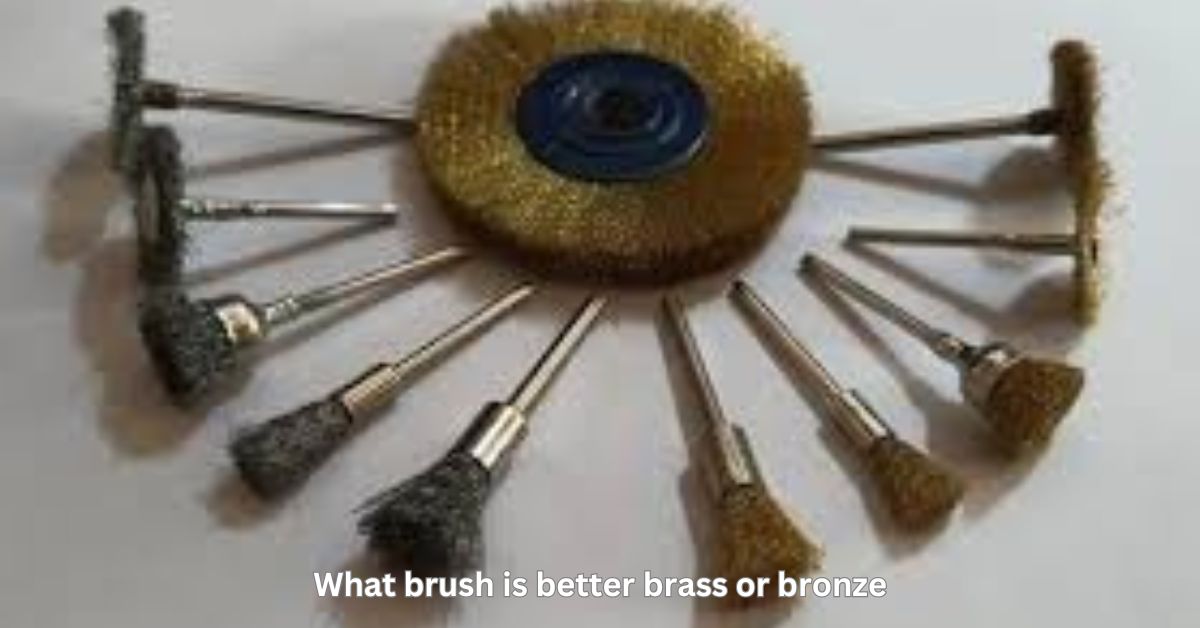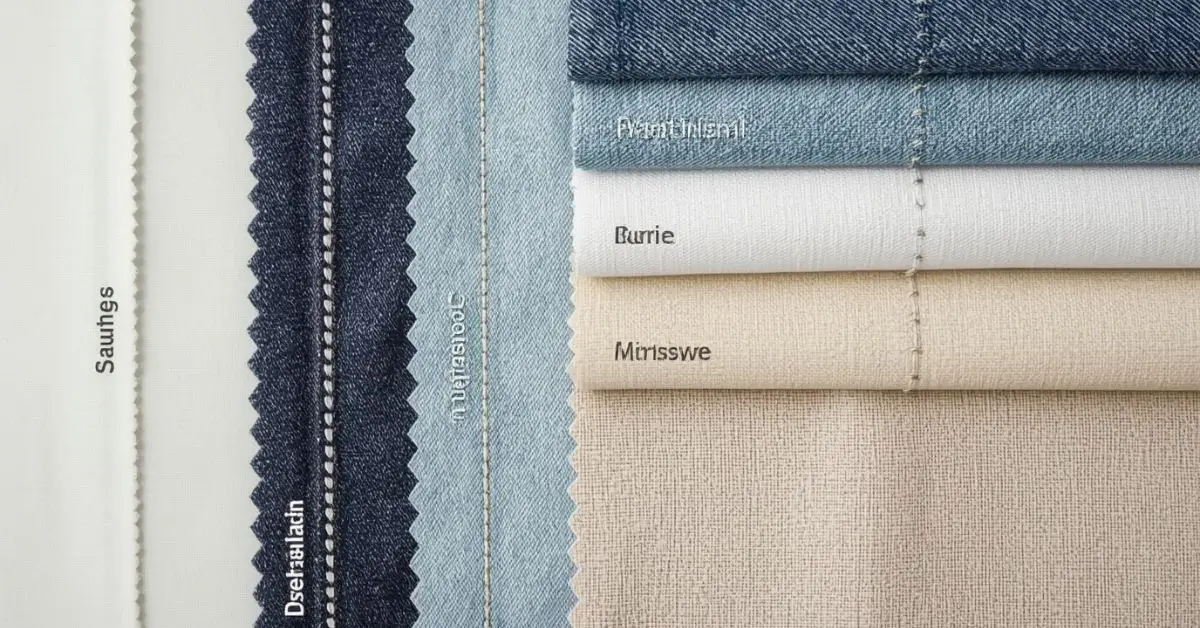FASHION
Brass or Bronze Brushes: Which Is Better for You

Brass vs. Bronze Brushes: Which Is Better for You?
When it comes to cleaning, polishing, or finishing surfaces, the type of brush you use can make all the difference. Two of the most popular types of brushes used for various applications are brass and bronze brushes. Both materials offer unique benefits and can be applied to different tasks, but deciding which one is right for you depends on several factors, including the specific job, the material you’re working with, and the results you expect to achieve. What brush is better brass or bronze?
In this article, we will explore the key differences between brass and bronze brushes, their applications, and how to choose the right one for your needs. Whether you’re a professional, a hobbyist, or someone looking to upgrade your tools, this guide will help you make an informed decision.
Introduction: The Importance of Choosing the Right Brush
When it comes to tasks like polishing, cleaning, or finishing surfaces, choosing the right brush is essential for achieving optimal results. Both brass and bronze brushes are commonly used in industries such as metalworking, automotive repair, and even crafting. These brushes come with different advantages, and understanding the distinction between the two materials will help you select the best tool for the job.
Brass and bronze brushes each have unique properties that make them suitable for specific tasks. To make an informed choice, let’s first examine the individual features of brass and bronze brushes, and then explore the main differences between them.
What Are Brass Brushes?
Features and Characteristics
Brass brushes are made with bristles that are composed of brass wire, an alloy of copper and zinc. The bristles are typically softer and more flexible than their bronze counterparts. This makes them ideal for delicate or softer surfaces. Brass wire also resists rust and corrosion relatively well, although it may not be as durable as bronze when exposed to extreme conditions.
Brass brushes are lightweight, easy to handle, and provide a smooth, non-abrasive finish that works well for tasks that require precision and attention to detail. Because the brass bristles are softer than other materials like steel, brass brushes are often used for light to moderate cleaning and polishing tasks.
2.2. Common Applications of Brass Brushes
Brass brushes are commonly used in the following applications:
- Cleaning delicate metal surfaces: Brass brushes are ideal for cleaning soft metals like aluminum, brass, and copper without damaging the surface.
- Polishing jewelry: The softness of brass makes it perfect for polishing jewelry, ensuring that the intricate designs and fine details are not scratched or marred.
- Soldering and electronics: Brass brushes are often used to clean the surfaces of electronic components or to remove flux residue from soldering work.
- Car maintenance: Brass brushes are sometimes used to clean engine parts or other components in vehicles, especially where gentle cleaning is needed to prevent scratching.
What Are Bronze Brushes?
Features and Characteristics
Bronze brushes are made from a mixture of copper and tin, which gives them a distinct set of properties. The combination of copper and tin in bronze results in a brush that is harder and more durable than brass. Bronze brushes are often used for more aggressive cleaning tasks and offer a higher level of wear resistance.
Because of the hardness of bronze, these brushes can handle more abrasive work and are often used for tougher materials and more challenging cleaning tasks. They also have excellent corrosion resistance and can endure extreme environments better than brass brushes.
Common Applications of Bronze Brushes
Bronze brushes are commonly used in the following applications:
- Heavy-duty cleaning: Due to their hardness, bronze brushes are ideal for cleaning hard metals like steel and iron, where more aggressive action is needed.
- Marine applications: The corrosion resistance of bronze brushes makes them suitable for marine environments where saltwater can quickly degrade other types of materials.
- Automotive work: Bronze brushes are often used to clean engine parts, brake components, and other automotive applications that require tough, durable tools.
- Sculpting and metalwork: Bronze brushes are frequently used in metalworking and sculpture to clean and finish hard metal surfaces.
Brass Brushes vs. Bronze Brushes: Key Differences
Durability
One of the main differences between brass and bronze brushes is their durability. Bronze brushes are more durable than brass brushes because of their higher hardness and resistance to wear. This makes bronze brushes more suitable for heavy-duty tasks that involve tough materials. Brass brushes, on the other hand, are softer and less resistant to wear, making them more appropriate for delicate tasks where precision is required
Hardness and Flexibility
Brass is a softer metal than bronze, which makes brass brush more flexible and ideal for jobs that require a gentler touch. The flexibility of brass makes it less likely to scratch or damage softer surfaces. In contrast, bronze brushes are harder and more rigid, making them better for tougher cleaning or polishing jobs, but they may cause damage to softer materials.
Corrosion Resistance
Both brass and bronze offer some resistance to corrosion, but bronze generally performs better in harsh, corrosive environments. Bronze brushes are more resistant to rust and corrosion, particularly in marine or outdoor settings where exposure to moisture is common. Brass brushes, while resistant to corrosion, can still suffer from wear over time when exposed to high humidity or moisture.
How to Choose the Right Brush for Your Needs
Consider the Material You’re Working With
When choosing between a brass and bronze brush, it’s important to consider the material you’re working with. Brass brushes are excellent for cleaning softer metals like copper, brass, and aluminum. Bronze brushes, on the other hand, are better suited for cleaning harder metals like steel and iron, where a more durable brush is needed.
Understand the Type of Cleaning or Polishing Required
If you need a brush for light cleaning or delicate polishing tasks, a brass brush may be the better option. For more aggressive cleaning, especially with tougher materials or in outdoor settings, a bronze brush will provide the durability and resistance needed to get the job done.
Evaluate Durability and Lifespan
Consider how long you need the brush to last and how often you will be using it. If you need a tool that can withstand heavy use and tough conditions, a bronze brush is likely to be a better investment. If you’re working with softer materials and require precision, a brass brush will offer the flexibility and gentleness you need.
Pros and Cons of Brass Brushes
Pros:
- Softer and more flexible, ideal for delicate surfaces.
- Provides a smooth, non-abrasive finish.
- Great for cleaning and polishing softer metals.
- Lightweight and easy to handle.
Cons:
- Less durable than bronze, may wear out faster.
- Not suitable for heavy-duty tasks or tough materials.
Pros and Cons of Bronze Brushes
Pros:
- More durable and resistant to wear and corrosion.
- Suitable for heavy-duty cleaning and tougher materials.
- Longer lifespan compared to brass brushes.
Cons:
- Harder and less flexible, which may cause damage to delicate surfaces.
- Typically more expensive than brass brushes.
Conclusion: Which Brush Is Better for You?
Ultimately, the choice between a brass and a bronze brush comes down to the nature of your project and the materials you’re working with. If you need a brush for delicate tasks or to clean softer metals, a brass brush will be more appropriate. However, for more heavy-duty cleaning or when working with harder materials, a bronze brush offers superior durability and resistance to wear.
When choosing between the two, consider factors such as the material of the surface, the type of cleaning or polishing required, and how often the brush will be used. By selecting the right brush, you can ensure that you achieve the best results for your work while extending the lifespan of your tools.
FASHION
Nahttypen for Sewing Projects: A Practical Guide

Anyone who has ever sat at a sewing machine knows this truth: choosing the right nahttypen determines whether your garment is durable, stylish, and comfortable to wear. Beginners often wonder why their seams rip or why fabric edges fray so quickly—and the answer almost always lies in selecting the right seam technique. From the simple seam to the versatile overlock seam and the elegant French seam, every type serves its own unique purpose.
Why Seam Types (Nahttypen) Matter
A seam isn’t just two pieces of fabric stitched together—it directly impacts:
- Strength: Prevents tearing when the garment is under stress.
- Appearance: Defines the look, shape, and finish.
- Comfort: Reduces irritation and bulk.
- Durability: Keeps fabric edges from fraying over time.
Many hobby sewers underestimate this. One sewing enthusiast once joked: “I thought as long as it was stitched, it was fine—until my trousers split after one week. Once I tried a flat-felled seam, they finally held together.”
That’s why understanding nahttypen is essential: it’s about combining creativity with the right technical choices.
The Most Important Seam Types (Nahtarten)
There are countless nahtarten, but most can be grouped into basic and specialized seams. Each works best with certain fabrics, purposes, and designs.
Simple Seam (Einfache Naht)
The simple seam is the foundation of sewing. Two fabric pieces are placed right sides together and stitched along the edge.
- Pros: Quick, easy, ideal for beginners.
- Cons: Needs finishing (zigzag, serger) to avoid fraying.
Overlock Seam (Overlock-Naht)
The overlock seam has become a favorite in modern sewing. It stitches, trims, and finishes edges in one step.
- Best For: Stretch fabrics like jersey, knits, or sportswear.
- Pros: Elastic, professional look, efficient.
- Cons: Requires an overlock machine, which can be expensive.
In 2025, smart overlock machines now auto-adjust thread tension and even recommend the right seam allowance (Nahtzugabe) on a digital screen.
French Seam (Französische Naht)
The French seam is elegant and ideal for delicate fabrics like silk, chiffon, or organza. The seam is sewn twice, enclosing raw edges inside.
- Pros: Clean, refined, perfect for sheer fabrics.
- Cons: Uses more time and fabric allowance.
Flat-Felled Seam (Kappnaht)
You’ll recognize the flat-felled seam from denim jeans. It’s extremely durable and lies flat, giving garments extra strength.
- Best For: Jeans, workwear, outdoor clothing.
- Pros: Very strong, prevents fraying, decorative.
- Cons: Slightly more complex to sew.
Double Seam (Doppelte Naht)
A double seam uses two rows of parallel stitching for extra reinforcement.
- Best For: Heavy-duty fabrics or areas under stress.
- Pros: Strong, stylish.
- Cons: More visible, not suitable for all designs.
Flat Seam (Flachnaht)
A flat seam is commonly used in activewear and underwear. It creates minimal bulk and avoids friction against the skin.
- Pros: Smooth, comfortable, stretchy.
- Cons: Requires specialized machines in most cases.
Sealed Seam (Versiegelte Naht)
The sealed seam is widely used in modern outdoor gear like rain jackets and tents. Special tape is applied to make the seam waterproof.
- Pros: 100% water-resistant, durable.
- Cons: Needs heat-sealing equipment, not for home beginners.
Decorative Seam (Dekorative Naht)
Not all seams are purely functional. Decorative seams highlight design with contrasting thread, embroidery, or special stitches.
- Pros: Adds visual appeal.
- Cons: Less structural strength, mostly aesthetic.
Industrial Seam Types (Industrienahttypen)
In mass production, industrial seam types combine automation with durability. These include chain stitches, cover stitches, and automated bonding.
- Pros: Efficient, consistent, long-lasting.
- Cons: Requires factory-grade machines.
Seam Allowance (Nahtzugabe) Explained
Every seam needs a seam allowance (nahtzugabe)—the extra fabric margin between the stitch line and the raw edge.
- Standard seam allowance: 1 cm for garments, 1.5 cm for tailored pieces.
- Too little: Seams unravel quickly.
- Too much: Adds bulk and reduces garment drape.
Pro tip: Mark your seam allowance clearly with tailor’s chalk or use sewing machine guides to ensure precision.
Real-Life Example
A small fashion startup in Berlin struggled with returns because the inner seams of their silk blouses frayed. Instead of using a simple seam with serging, they switched to French seams. Within two months, complaints dropped significantly, and customers praised the premium quality finish.
The founder remarked: “That one change in seam type made our designs look high-end—and customers noticed instantly.”
Pros and Cons of Different Seam Types
| Seam Type | Pros | Cons | Best Use Case |
|---|---|---|---|
| Simple Seam | Easy, beginner-friendly | Needs finishing | Everyday sewing |
| Overlock Seam | Strong, elastic, neat edges | Needs special machine | Knits, stretch fabrics |
| French Seam | Elegant, hides raw edges | Time-consuming, uses more fabric | Sheer or delicate fabrics |
| Flat-Felled Seam | Very durable, decorative | Complex, thicker seams | Denim, workwear |
| Double Seam | Extra strong, stylish look | More visible, less flexible | Heavy-duty garments |
| Flat Seam | Comfortable, low bulk | Requires specialized machines | Sportswear, underwear |
| Sealed Seam | Waterproof, durable | Needs sealing tape/equipment | Outdoor gear, rainwear |
| Decorative Seam | Stylish, adds character | Low strength, mostly aesthetic | Fashion design details |
FAQ’s
What are the most common seam types in sewing?
The most common are the simple seam, overlock seam, French seam, and flat-felled seam. These cover everything from everyday wear to delicate or durable garments.
Which nahttypen type is best for stretchy fabrics?
The overlock seam or flat seam works best, as both allow flexibility and prevent breakage when the fabric stretches.
How much seam allowance should I use?
A standard seam allowance (nahtzugabe) is 1–1.5 cm. Use smaller allowances for lightweight fabrics and wider ones for heavy or fray-prone textiles.
Can decorative seams be strong enough for clothing?
Yes, but they’re usually paired with another seam type. A decorative seam is mainly for design, not for holding heavy stress areas.
Conclusion
Understanding nahttypen is like mastering the alphabet of sewing. From the humble simple seam to advanced industrial seam types, the right choice transforms your project’s durability and design. With today’s mix of traditional craftsmanship and smart sewing technology, even beginners can achieve professional results.
FASHION
Top 10 Blazertje Styles for Every Occasion

A dames blazertje (women’s blazer) is a power move in 2025. Women use it not only as a professional staple but also as a playful fashion piece. Pairing a pastel blazertje with mom jeans creates an effortlessly chic look, while a fitted black blazer over a dress transforms the outfit into something ready for evening cocktails.
A fashion blogger recently shared: “Every time I wear my oversized blazertje, I get compliments—even if I’m just wearing sneakers underneath.” This shows how a single piece can elevate confidence and appearance instantly.
The Rise of the Heren Blazertje
Men have also embraced the heren blazertje (men’s blazer) as a wardrobe essential. Slimmer fits and lightweight fabrics make it comfortable enough for everyday wear. In 2025, we see more men styling blazertjes with t-shirts, loafers, and even cargo pants—breaking the stereotype that blazers are strictly for suits.
The key is adaptability. A grey heren blazertje can double up as office wear during the day and switch to a casual dinner jacket at night with just a shirt swap.
Trendy Blazertje Styles in 2025
Fashion is cyclical, but blazertjes have taken on new shapes this year:
- Oversized Trendy Blazertje – popular among Gen Z for its relaxed streetwear vibe.
- Cropped Blazertje – great for layering over high-waisted trousers and skirts.
- Double-Breasted Blazertje – making a comeback with bold buttons and structured shoulders.
- Bold Colors & Prints – from neon green to plaid, the trendy blazertje is all about standing out.
If you’re wondering whether this trend is worth investing in—the answer is yes. These modern variations keep the classic blazer relevant and fashion-forward.
Zomer Blazertje: Light, Breezy, and Perfect for Heat
The zomer blazertje (summer blazer) is all about breathable fabrics and lighter shades. Cotton, linen, and blends dominate this category, ensuring you don’t overheat while maintaining a smart look.
Imagine a beige zomer blazertje over a white shirt, paired with chinos and loafers. It’s ideal for weddings, summer parties, and even casual Friday at the office. The lighter weight makes it easy to fold and carry, too.
How to Find a Goedkoop Blazertje Without Sacrificing Quality
Many people assume that a blazer is an expensive item, but that’s not always true. A goedkoop blazertje (cheap blazer) can still look stylish if you know what to look for:
- Check the seams – clean, straight stitching is a sign of quality.
- Fabric blends – polyester-cotton blends can be durable and affordable.
- Minimal designs – avoid unnecessary embellishments; simpler is often more elegant.
Fast fashion brands often sell blazertjes for under €50, but investing a little more in mid-range options ensures better longevity.
Slim Fit Blazer: The Sharp, Modern Classic
For those who prefer a tailored silhouette, the slim fit blazer remains a top choice. It hugs the shoulders and tapers at the waist, giving a sleek appearance.
This style works exceptionally well for both men and women, especially in professional settings. For men, a navy slim fit blazer is a timeless option. For women, a slim fit blazer in cream or white looks striking over both dresses and trousers.
Katoenen Blazertje: Comfort Meets Versatility
If comfort is your priority, a katoenen blazertje (cotton blazer) should be at the top of your list. Cotton makes it breathable, easy to wash, and less formal compared to wool or polyester.
A cotton blazertje pairs beautifully with denim, sneakers, or even shorts in the summer. Its wrinkle-resistant qualities also make it a favorite for travel.
Outfit Met Blazertje: Styling Tips for Any Occasion
Creating the perfect outfit met blazertje (outfit with blazer) is easier than you think. Here are a few combinations for inspiration:
- Casual Day Out: White t-shirt + ripped jeans + pastel blazertje + sneakers.
- Office-Ready: Slim fit blazer + tailored trousers + loafers or heels.
- Evening Look: Chique blazertje + silk camisole + leather pants + stilettos.
- Weekend Brunch: Oversized cotton blazer + shorts + sandals.
The key is layering. A blazertje adapts to any style depending on what you pair it with.
Chique Blazertje for Special Occasions
A chique blazertje is your go-to when you want to look polished at weddings, parties, or important events. Think velvet, satin, or embellished fabrics that add sophistication.
Women often style a chique blazertje over cocktail dresses, while men might pair it with tailored trousers and a crisp shirt. It’s elegance without being overdone.
Real-Life Inspiration
One user tweeted: “I wore my pastel blazertje to a wedding, and three people asked me where I bought it. I guess it’s the ultimate compliment when your outfit does the talking.”
This perfectly illustrates why investing in a good blazertje pays off—it catches attention in the right way.
Pros and Cons of Owning Multiple Blazertjes
Pros:
- Versatility across seasons and occasions
- Easy to dress up or down
- Timeless style with modern variations
Cons:
- High-quality options can be expensive
- Poor fits ruin the look if not tailored properly
- Requires ironing/steaming for a crisp appearance
FAQs
What’s the difference between a blazer and a blazertje?
A blazer is typically more formal and structured, while a blazertje is lighter, shorter, and easier to style casually.
Can I wear a blazertje in summer?
Yes! A zomer blazertje in cotton or linen is designed to keep you cool while looking sharp.
How do I style a dames blazertje for work?
Pair it with slim trousers, a blouse, and heels. Neutral colors like black, navy, and beige work best for professional settings.
Are goedkoop blazertjes worth it?
They can be, if you choose wisely. Look for good stitching, minimal design, and breathable fabrics to get the best value.
Final Thoughts
The blazertje continues to dominate wardrobes in 2025 because of its balance of comfort, style, and versatility. Whether you’re looking for a casual blazer for daily wear, a slim fit blazer for work, or a chique blazertje for special events, there’s a version out there for everyone.
FASHION
Elegance in Every Fold:Wedding Party Handkerchiefs

Wedding Party Handkerchiefs stand out as elegant accessories that blend tradition with personal sentiment. These delicate pieces of fabric are more than just practical items; they embody thoughtful gestures, heartfelt emotions, and exquisite style.
The Timeless Appeal of Wedding Party Handkerchiefs
Handkerchiefs have been cherished for centuries, serving both functional and symbolic roles. In the context of weddings, they often represent comfort, remembrance, and a token of appreciation. Made from luxurious materials like fine cotton, linen, or silk, these handkerchiefs can be embroidered with initials, dates, or meaningful quotes, creating personalized keepsakes that guests and party members treasure long after the ceremony.
Their delicate texture and subtle sheen complement a variety of wedding styles—from classic vintage affairs to modern minimalist celebrations
Choosing the Perfect Fabric and Design
Selecting the right fabric is key to ensuring wedding party handkerchiefs not only look beautiful but also feel comfortable. Soft linen is prized for its breathability and natural texture, making it ideal for spring or summer weddings. Silk, with its smooth finish and elegant drape, lends a luxurious touch suitable for formal, black-tie events. Cotton blends offer durability and ease of care, which appeals to couples seeking practicality without sacrificing style.
How Wedding Handkerchiefs Enhance Wedding Party Attire
Handkerchiefs are subtle yet impactful additions to wedding party attire. For groomsmen, a crisp, embroidered handkerchief tucked into the suit pocket can elevate the look with a dash of color and refinement. Coordinating the handkerchief’s color or pattern with ties, boutonnieres, or dress shirts creates visual harmony across the wedding party.
Bridesmaids can carry beautifully embroidered handkerchiefs in place of traditional bouquets for a softer, nostalgic look.
Symbolism and Sentiment Behind Wedding Handkerchiefs
Beyond their aesthetic appeal, wedding handkerchiefs carry rich emotional symbolism. Traditionally, they represent comfort and compassion, making them perfect gifts for loved ones who may shed tears of joy. Handkerchiefs given by the bride to her mother or maid of honor express gratitude and honor familial bonds.
Some couples use handkerchiefs to honor lost loved ones by sewing a small fabric swatch from a cherished garment into the design, weaving memory into the celebration. This practice adds profound meaning to the day and allows absent family members to be symbolically present.
Customization Ideas for Memorable Wedding Handkerchiefs
The beauty of wedding handkerchiefs lies in their versatility. Customization options are nearly endless and help elevate these simple cloths into treasured heirlooms.
-
Monogramming: Adding initials or names in elegant fonts personalizes the handkerchief while keeping the design classic. Metallic or pastel thread colors can coordinate with the wedding palette.
-
Date and Location Embroidery: Incorporating the wedding date or venue details adds a subtle reminder of the special day.
-
Color Matching: Custom dyeing the fabric to match wedding colors ensures that the handkerchief complements the overall aesthetic.
Incorporating Handkerchiefs Into Wedding Traditions
Handkerchiefs can be woven into numerous wedding customs to deepen their significance. In some cultures, they are passed down through generations or used in symbolic rituals like “something old” or “something borrowed.” During ceremonies, the bride might carry a handkerchief for wiping tears, or the groom might present one to his bride as a token of devotion.
Additionally, handkerchiefs make thoughtful additions to the reception. They can be offered to guests during emotional speeches or used as decorative napkins, tying form and function beautifully together.
Caring for Your Wedding Party Handkerchiefs
Because these items often become cherished keepsakes, proper care ensures they stay pristine. Gentle hand washing with mild detergent is recommended, avoiding harsh chemicals or high temperatures that may damage delicate fabrics or embroidery. After washing, laying the handkerchief flat to dry helps maintain shape and prevents wrinkles.
For long-term storage, keeping handkerchiefs in acid-free tissue paper within a breathable box protects them from discoloration and fabric deterioration, preserving their elegance for years to come.
Frequently Asked Questions (FAQs)
Q: Are wedding party handkerchiefs suitable for both bridesmaids and groomsmen?
Yes, handkerchiefs are versatile gifts that work well for all members of the wedding party, adding a personal touch regardless of gender.
Q: How far in advance should I order custom embroidered handkerchiefs?
It’s best to order at least 6-8 weeks before the wedding date to allow for customization and shipping.
Q: Can handkerchiefs be used as wedding favors?
Absolutely. Many couples choose handkerchiefs as elegant keepsakes for guests, especially when personalized with monograms or wedding details.
Q: What materials are best for handkerchiefs in hot weather weddings?
Lightweight linen or cotton are ideal for warm climates due to their breathability and softness.
Q: How can I incorporate handkerchiefs into my wedding theme?
Choose fabric colors, embroidery designs, or printed patterns that reflect your wedding palette and style to create cohesion.
Conclusion
Wedding party handkerchiefs are much more than delicate fabrics—they are tokens of affection, symbols of tradition, and elegant accessories that enhance the wedding experience. Their blend of practicality and sentimentality makes them ideal gifts for bridesmaids, groomsmen, and loved ones, while their customization options ensure each piece is uniquely meaningful.
-

 GENERAL9 months ago
GENERAL9 months agoClassroom6x: Revolutionizing the Future of Learning
-

 ENTERTAINMENT9 months ago
ENTERTAINMENT9 months agoUnveiling the Mystery of Kashito_Toto: A Digital Frontier
-

 TECHNOLOGY9 months ago
TECHNOLOGY9 months agoUnlocking the Power of SSIS 816: A New Era in Data Integration
-

 TECHNOLOGY9 months ago
TECHNOLOGY9 months agoUnlocking the Mystery of Vy6ys: A Hidden Gem
-

 GENERAL9 months ago
GENERAL9 months agoQuid Pro Quo Harassment: What It Is and Why It Matters
-

 GENERAL9 months ago
GENERAL9 months agoUnraveling Time: What Hour Was It 8 Hours Ago?
-

 BUSNIESS9 months ago
BUSNIESS9 months agoWhat Does ‘In Transit’ Mean? Understanding Shipment Status
-

 HEALTH9 months ago
HEALTH9 months agoKingymab: Redefining Fitness and Wellness Excellence


